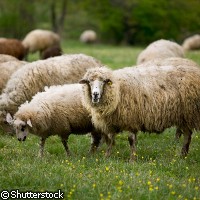Livestock face climate change quagmire
An alarm has sounded on how global warming could impact European livestock. Speaking to members of the Society for General Microbiology (SGM) recently, Professor Peter Mertens from the Institute for Animal Health (IAH) in the UK cautioned that ruminants have been dealt major blows within the last decade, triggered by the rising temperatures on Earth. More than two million ruminants, especially sheep, have fallen victim to outbreaks of bluetongue (BT) in Europe since 1998 and experts believe the rising temperatures are responsible for this problem. Sparked by the Bluetongue virus serotype (BTV-8), the outbreak reared its ugly head in Belgium and the Netherlands in 2006, and then spread to other European countries such as the UK the year after. The experts note this outbreak, which was the first ever recorded in northern Europe, was not an isolated event. Concerns over related viruses emerging have grown. For example, the African horse sickness virus shares the same insect vectors as Bluetongue, and can prove fatal in over 95% of cases. 'We have seen outbreaks caused by 12 strains, from 9 distinct serotypes of bluetongue virus, which have arrived in Europe via at least 4 different routes since 1998,' explained Professor Mertens. 'This indicates that there has been a fundamental shift in bluetongue epidemiology, linked to climate change.' Last year, the UK vaccinated more than 10 million sheep and cows against BTV-8. 'The UK was the only country in Europe to successfully suppress the disease outbreak,' Professor Mertens noted. 'However, different BT virus types have subsequently arrived in northern Europe which represent further threats to the UK for 2009 and beyond.' Based on what has occurred in recent years, the entire region is vulnerable to further incursions of the BT virus and other insect transmitted viruses, he said, adding that these viruses could wreak havoc on human lives as well. 'Although the vaccines against BT virus currently available for use in northern Europe are relatively crude, as they are made from inactivated virus grown in tissue culture cells, it is clear that they can work against BTV-8,' the scientist told the SGM members. 'However, more advanced vaccines, made from the protein-subunits of the virus, along with diagnostic tests that can distinguish vaccinated from infected animals, are urgently needed.' The biting midge Culicoides imicola is responsible for spreading bluetongue, and it recently colonised the northern Mediterranean coast, which triggered outbreaks in the affected regions. It should be noted, however, that other vector species of midge, such as C. pulicaris and C. obsoletus, also contribute to BT outbreaks. These two have surfaced in central and northern Europe. The experts state that rising temperatures can increase the rate of infection and virus replication in the midge, effectively intensifying their activity in northern Europe. Established in 1945, the Society for General Microbiology is comprised of academia, government agencies, research centres and industry from over 60 nations worldwide.



